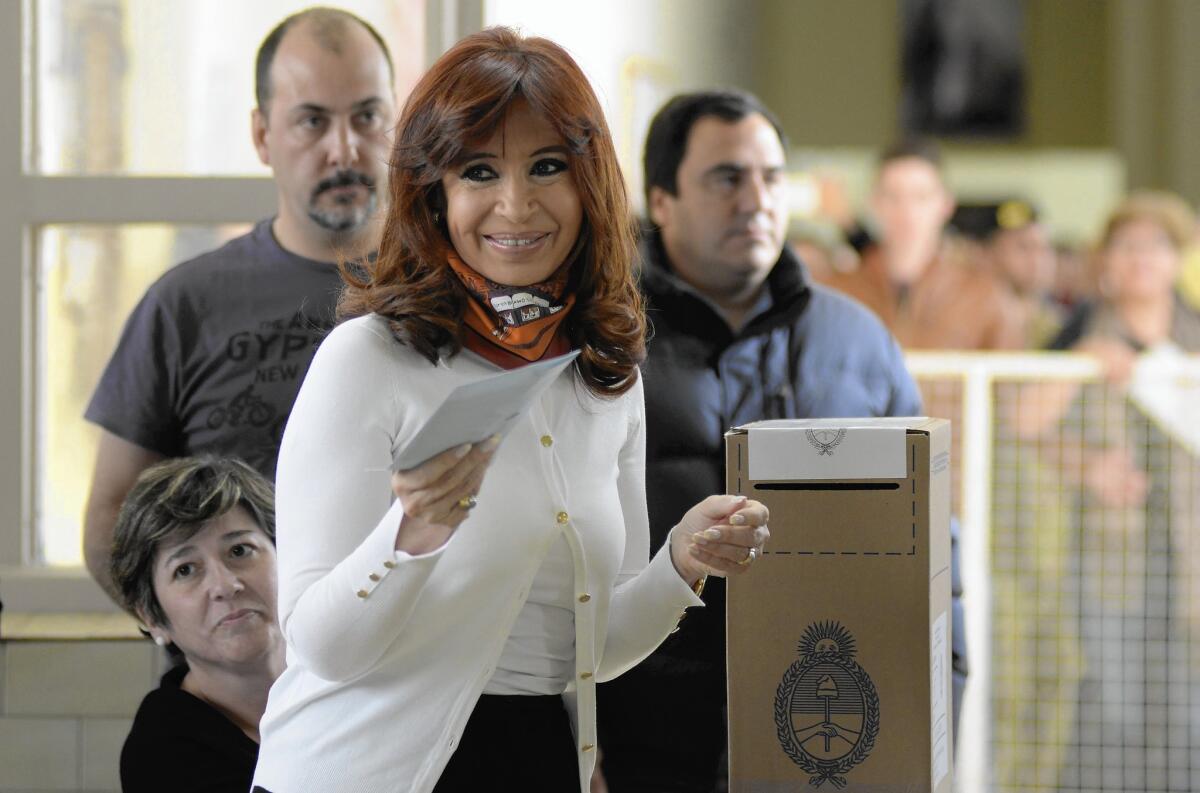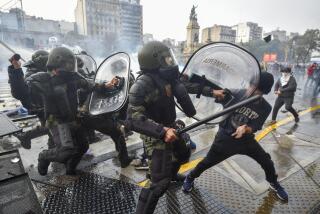Turnout is heavy in Argentina’s presidential election

President Cristina Fernandez de Kirchner prepares to cast her vote in Rio Gallegos, Argentina, on Oct. 25.
- Share via
reporting from BUENOS AIRES — Argentine voters turned out in big numbers Sunday to decide whether the anointed favorite of President Cristina Fernandez de Kirchner will succeed her.
Buenos Aires state Gov. Daniel Scioli was favored to win the first round of voting against his two main opponents, Buenos Aires Mayor Mauricio Macri and Congressman Sergio Massa. More than 32 million voters were eligible to vote.
Less certain is whether Scioli, 58, a former vice president and champion speedboat racer, can tally the 45% of votes he needs to win outright. Winning 40% could also mean victory if he outpolls the second place finisher by at least 10 percentage points. Otherwise a second round will be held next month.
Observers reported a relatively heavy voter turnout in cold but mostly sunny weather nationwide. Many voters cast their ballots early so they could return home in time to watch the Argentine national rugby team lose to Australia in the televised semifinals game of the world championship in London.
Riding the still solid, if reduced, national support for Fernandez, Scioli promised to continue her social welfare policies with some changes, including a harder line on rising crime. He diverged in calling for economic reforms, including the settling of a decade-old bond default.
“I voted for Scioli because I understand he will maintain the project that Nestor and Cristina began,” said 30-year-old graphic designer Emilio Ferreyra after voting in the capital, referring to Fernandez and her late husband, Nestor Kirchner. “It’s a way of staving off the right wing.”
After voting in the Dique Lujan section of the capital, Buenos Aires, Scioli, who was running on the Victory Front ticket, declined to predict an outcome. “I have done my best like the other candidates and made with all my effort,” he said.
The election marks the end of Kirchnerismo, a populist political approach emphasizing social welfare programs that began in 2003 with the election of Nestor Kirchner. Fernandez will finish her second four-year term Dec. 10. The couple’s son, Maximo, was running for a National Congress seat for Santa Cruz state.
Many voters are happy with Fernandez’s efforts to redistribute wealth and create a social safety net, but others said they were tired of her heavy hand in the nation’s affairs.
“I voted for Massa, a wasted vote,” said human resources manager Florencia Borre , 43, of Buenos Aires. “His discourse was closest to what I think should be done. But in any case I wasn’t so convinced.”
Fernandez and her late husband earned support with policies that helped the nation recover from economic collapse in 2001 as well as aggressive prosecution of those who killed, kidnapped and tortured thousands of victims during the military dictatorship that ruled from 1976 to 1983.
“After Dec. 10, I’ll be an activist,” Fernandez told supporters after voting in the southern city of Rio Gallegos. “We kept our promise, are voting in a normal country.”
Special correspondents D’Alessandro reported from Buenos Aires and Kraul from Bogota, Colombia.
More to Read
Sign up for Essential California
The most important California stories and recommendations in your inbox every morning.
You may occasionally receive promotional content from the Los Angeles Times.










